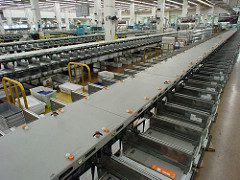
I spent Election Day in—of all places—Las Vegas, Nevada. The slot machines garishly blaring in the lobby, and the Trump hotel down the block were all apt symbols for the America many of us feel ourselves rudely thrust into. I was in town for the annual gathering of the ESOP Association, a membership meeting of hundreds of companies with Employee Stock Ownership Plans. In the post-election atmosphere, that gathering proved apt in a different way. The dialogues I took part in showed me that advancing employee ownership will not be imperiled by a Trump presidency. Indeed, this approach to rebuilding the middle class may be uniquely suited to the new political world. It is one of the most promising paths forward for progressives at this moment.
Here are four reasons why:
- Support for employee ownership is bipartisan; both Ronald Reagan and Bernie Sanders were proponents.
- Employee ownership in the U.S. does not require new federal policy; handsome tax advantages are already present in the law.
- What is needed to advance employee ownership, primarily, is increased awareness. That work can advance, no matter who occupies the Oval Office.
- Most importantly, employee ownership directly addresses the issue of wealth inequality that has driven populist sentiment on both the right and left. It is a powerful way to improve the fortunes of ordinary workers and to build an enduring, just economy that is not subject to the whims of electoral politics.
On the final day of the conference, Janet Boguslaw of Brandeis University recounted the story of Henry, 55, whose life was transformed by the power of employee ownership. Henry had grown up in a large family where his mother worked in a grocery store and his father took on odd jobs. Henry was working for minimum wage at a company when it shuttered its doors. He took on a new entry-level position at a different firm, which within five years became employee owned. The company paid for Henry to get an associate’s degree, and he advanced. Today, on top of his paycheck, he enjoys an ESOP account balance of $460,000, plus a company-sponsored pension plan of $80,000. He has medical insurance and can help his children attend college. He told Boguslaw, “I feel more comfortable talking to my kid’s teacher, and more comfortable coaching my kids’ teams.” He plans to retire in 10 years and possibly travel. As Boguslaw put it, “Here is a man who started at minimum wage and became part of the middle class.” The reason is employee ownership.
Stories like this are more common than most people suppose. While employee ownership is often missing from the progressive agenda, it has a substantial presence across the nation. In the U.S., there are more than 7,000 companies with employee ownership, covering more than 10 million employees, who collectively have assets of nearly $1 trillion.
Among these firms are companies like New Belgium Brewery in Denver, Colorado– maker of Fat Tire Amber Ale—where employees became 100 percent owners of the brewery in 2012. New Belgium is the fourth-largest craft brewer in the U.S., with some 685 employees and revenues of an estimated $225 million.
Another successful ESOP businesses is Recology in San Francisco. The company brings in $800 million in revenue and is 100 percent owned by its 3,000 employees, who perform waste collection and recycling services for tens of thousands of households and businesses in four states.
As the National Center for Employee Ownership notes, workers at employee-owned firms like these have more than double the retirement accounts than at traditional firms, and they are one-fourth as likely to be laid off. To move beyond a society controlled by and for the 1 percent, we need broad-based ownership of assets—including employee ownership of enterprises. It is ownership of assets that creates family stability and, collectively, economic power.
A movement for employee ownership is growing in the U.S. The Democracy Collaborative has joined with other organizations to launch a campaign, “50 by 50,” aimed at catalyzing 50 million employee owners by 2050. If achieved, this would mean one in four workers become workplace owners, and substantial wealth would be enjoyed by millions of families. It’s a glimpse of true economic democracy. And as we are seeing, without economic democracy, political democracy fails to thrive.
[Editor's note: This piece is adapted from one that first appeared on the Jericho Chambers website.]
(Image: By Jason V, via flickr, CC BY-SA 2.0)






Comments